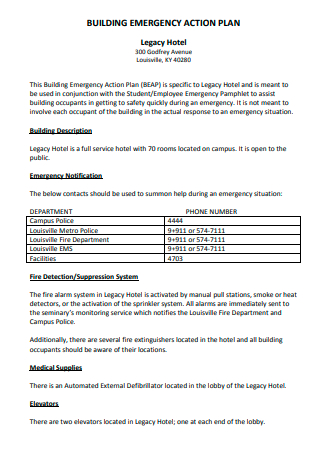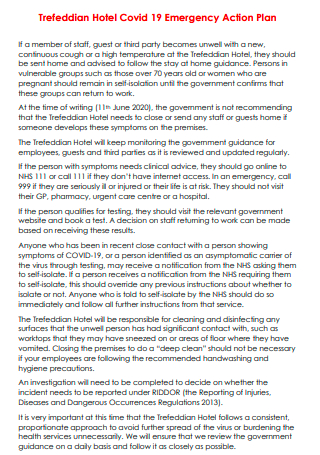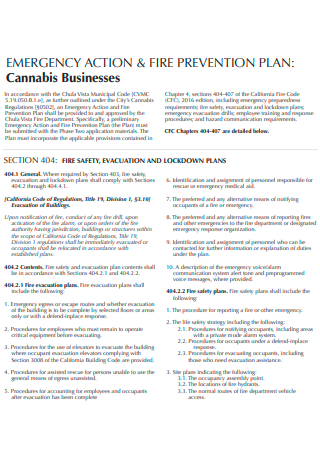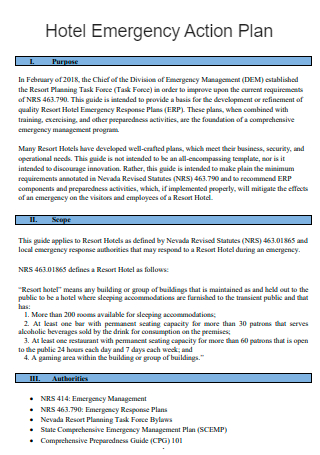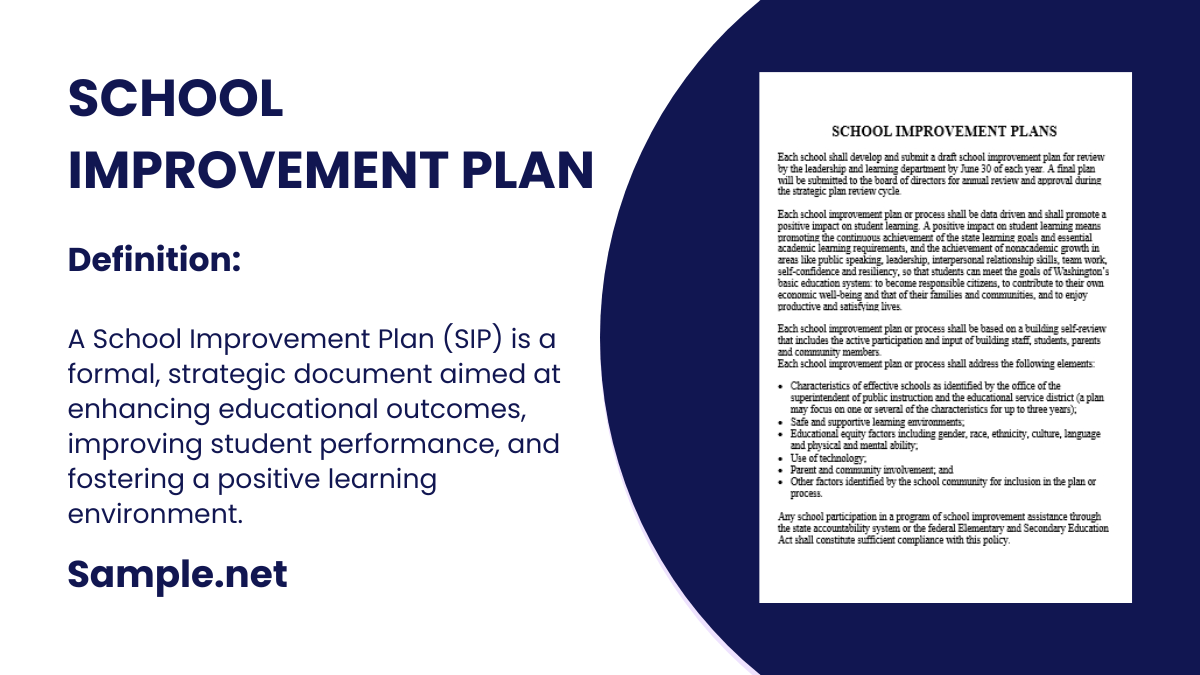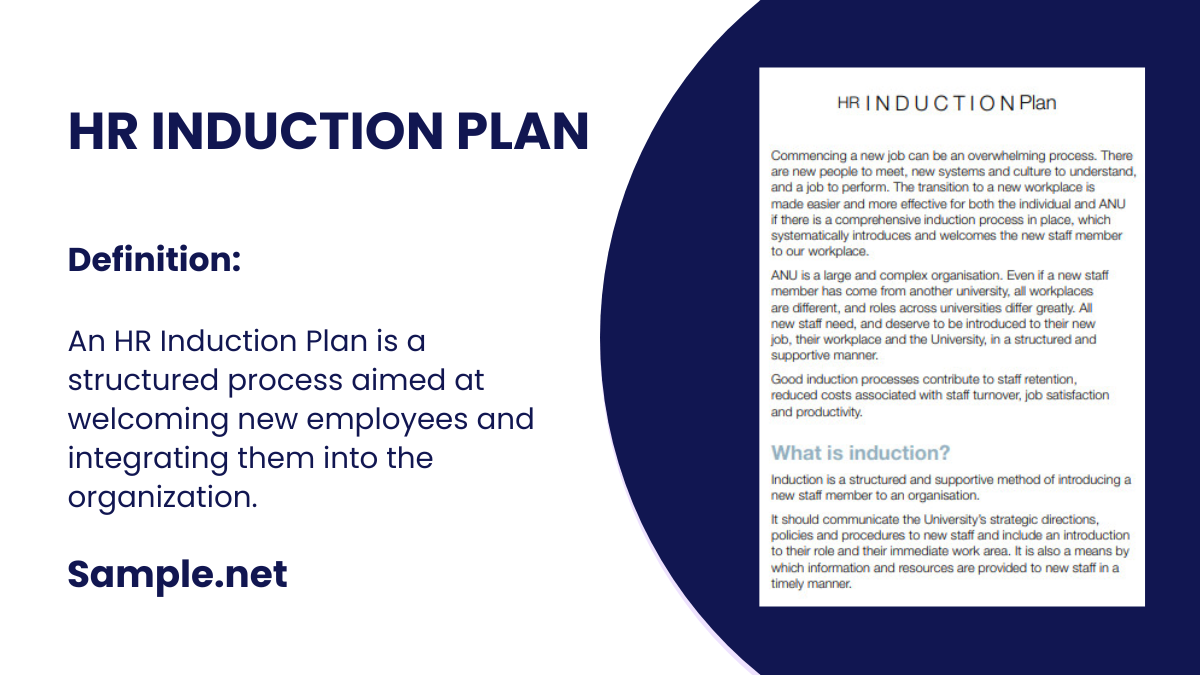A School Improvement Plan is a strategic blueprint aimed at enhancing educational outcomes for students. It outlines clear goals, targeted actions, and measurable benchmarks to ensure continuous development in…
continue reading
3+ Sample Hotel Emergency Action Plan
What Is a Hotel Emergency Action Plan?
A hotel emergency action plan is a sequence of instructions that must be followed in the event of an emergency. It is a guideline that must be followed in order to save and prioritize lives. Anticipating any form of emergency, from natural disasters to disease or epidemics, and developing an emergency action plan is simply one strategy to save lives and prevent potential harm. An evacuation plan and an emergency response plan may be included in a hotel emergency action plan. It is a detailed guideline that is normally printed and distributed by the hotel to both personnel and guests.
Preparing effective evacuation plans that is quite flexible whether you are executing the evacuation from a hotel, or a residence is not really optional. The procedures are simple: identify where you can head ahead of time, know what necessities you must bring, plan for supplies, and organize relevant paperwork. This procedure can be put to your hotel’s emergency action plan checklist and used in an emergency. Preparedness is only one approach to dealing with a crisis. Your hotel will receive more guests if it demonstrates its capability in times of emergency.
Types of Hotel Emergency
Engineers and architects must consider a building’s location and vulnerability to natural dangers while designing it. Not only that but providing easily accessible emergency exits is an essential. As a result, in an emergency, one can carry out their emergency action plan with ease. And, to help you understand what you need to plan for, below are some examples of hotel emergencies that management may encounter:
Advantages of Having a Hotel Emergency Action Plan
The significance of having an emergency action plan in place cannot be understated. When it comes to human lives, there is no guarantee, thus all one can do is take precautions to prevent jeopardizing them. As a result, below are some of the benefits of developing a hotel emergency action plan.
Tips on How to Create a Hotel Emergency Action Plan
So, you’ve come here to learn how to build an emergency action plan, not just to hunt for emergency action plan examples or downloadable hotel emergency action plan template pdf. Understandable. It is preferable to have firsthand knowledge of what you intend to create in the first place, as this will increase your chances of answering correctly throughout your presentation. Not dissimilar to a research paper defense, eh? Whatever the case may be, here are some ideas on how to create a hotel emergency action plan.
Tip 1: Expect Worst-Case Scenario
We don’t like thinking about the worst-case scenario since it not only frustrates us and gives us negative vibes, and it also doesn’t help lessen the fear inside our chest. However, when developing an emergency action plan, it is vital to consider the worst-case scenario. In an emergency, overdoing something may really be preferable to underdoing something. To be fully prepared for any form of emergency and to construct a list of procedures and instructions, it is best to include the toughest scenario. Dangers are as unexpected as the human mind, therefore preparing for the worst makes you more protected.
Tip 2: Write Clear and Simple Instruction
Actions are the universal language, yet they may be more difficult to comprehend in the face of peril. As a result, we settle for entrusting our lives to a manual. When writing a procedure, use the simplest words possible and avoid the use of sophisticated ones. Terms or jargon that only an expert or you understand will not aid anyone in an emergency situation. So, while creating directions, keep them short and straightforward.
Tip 3: Check the Equipment and Supplies
Hotels are frequently multi-story structures that accommodate hundreds of rooms for both guests and tourists. More crucially, each of these rooms must be capable of handling emergencies on their own. It must have essential survival provisions such as first aid kits, potable water, three days’ worth of food, flashlights, and other emergency supplies. Among these are adequate extinguishers and sprinklers in each hallway, as well as safety ropes and hammers to break glasses. If not in every room, then in every corridor. It is essential for a member of staff or a guest to have something on which they can rely in dire circumstances.
Tip 4: Determine When an Evacuation is Necessary
Not all crises necessitate evacuation; only certain incidents do. That being said, it should be apparent when management should evacuate and when it is okay for everyone to remain in place. Evacuation frequently causes anxiety, especially among guests. As a result, there should be a clear line drawn in your emergency action plan as to when to invoke one. It would also avoid introducing confusion, which could lead to even more panic.
Tip 5: Assess the Hotel for Exits and Evacuation Sites
Truthfully, this should be at the top. When developing an emergency action plan, one of the first steps is to assess and inspect the structure. It is critical that the evacuation site be a safe spot away from the threat in the first place, or that there be existing emergency exits that may be used.
Tip 6: Tests. Tests. Adjust
After you’ve created your initial emergency action plan, the best method to implement it is to keep testing its effectiveness and making the required tweaks to obtain the greatest outcome.
FAQs
What Are Hotel Emergency Procedures in the Event of a Fire?
No matter who you are, a guest or an employee, the best thing you can do initially is to remain calm and notify the fire department, making careful to provide as much information about the location of the fire as possible. If the situation is not so dire, a fire extinguisher could be used to put out the flames. If this is not possible, close all doors leading to the fire and follow the evacuation strategy.
Do Hotels Carry Out Drills?
As part of the emergency response plan, it is recommended that management conduct drills for the personnel every quarter or so. Hotel guests, on the other hand, are not forced to participate, therefore it is entirely optional for them.
What Are Some Other Common Situations That Are Considered Hotel Emergencies?
One of the most prevalent hotel crises is thievery that results in a reported lost and found. The guests experience panic and a sense of being unsafe as a result of this. Furthermore, it calls into question the hotel’s security in terms of preventing such an occurrence. Accidents are also common. It is an emergency since the victim may require medical assistance, and an accident may not be a solitary event. Earthquakes, like fires, necessitate an evacuation system, which is part of a hotel’s emergency action plan.
Emergency situations necessitate efficiency. Efficiency in dealing with a crisis and in saving lives. Let’s be honest: that’s a little much for one individual. That is why teamwork should be included in your emergency action plan checklist. More crucial, appoint people who can take the initiative. This is also an emergency, so grab and download sample hotel emergency action plan templates before you go!
